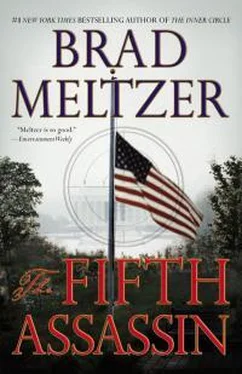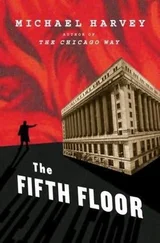It reminds me of the SCIFs we have at the Archives—the bombproof saferooms where the most classified documents are read. Like ours, this one has redundancies built-in: In addition to swiping your card, you also have to be cleared in manually.
On cue, Agent Reed swipes his ID through the scanner and then looks up toward the ceiling. A thin security cam, like the ones in the White House, stares down at us. “Viv, coming down,” he announces.
Down?
There’s a pregnant poomp —my ears pop—and the airtight steel door opens toward us. The foul whiff of—I can’t place the smell, but it’s awful as it wafts through the room.
I look back toward Palmiotti, who nods that it’s okay.
Before I can change my mind, Agent Reed grips my shoulder and adds a not-so-subtle shove. As I near the threshold, I finally place the smell. Burnt hair.
With our first step through the doorway, automated lights blink awake. Another burst of foul cool air belches from below. Industrial metal stairs go at least two stories down.
This isn’t a saferoom. Or a SCIF. Or even a basement.
This is where they brought President Bush after 9/11. One of the safest places in the entire United States. The real hidden tunnel below Camp David.
98
Eighteen years ago
Sagamore, Wisconsin
By now, it ran like clockwork.
The school bell rang at 3 p.m., and most kids reached the schoolyard by 3:05. Of course, there was always some screwing around in the schoolyard… a quick game of boxball or off-the-wall… and then the extra lingering that weeded out anyone with after-school commitments, tutors or piano lessons.
By 3:20, the group was set. There were sometimes a few variations, but like any neighborhood bar, the regulars were the regulars: Marshall, Beecher, Paglinni, Lee Rosenberg, Paul Mackles, and the rest. Every day, they’d gather around Marshall, humming impatiently in place until they found the critical mass that sent them weaving back across the six-block, eight-minute trip to their final destination: Marshall’s treehouse. No two ways around it, the Watchtower was finally living up to its name.
“Dibs on the beanbag!” Paglinni called out.
“I get the other!” Paul Mackles added as the rest of the group spread out, taking seats on the foldout beds, on the floor, or, as Lee Rosenberg (in his Lee jeans) always did, alone on one of the milk crates.
Otherwise, as Marshall gathered the porn from the hiding spots—in the Lucky Charms box… under the mattresses in the foldout beds—there was no arguing. As he handed out copies, they all knew the math. There were seven magazines in total, so the group would peacefully, without fuss, silently pair off into seven smaller factions. Paglinni usually got his own. Same with Mackles and any of the other older ones. The rest would share.
At this point, after nearly two weeks with their X-rated contraband, every member of the group had been through the photos hundreds of times. But that didn’t mean they were finished. Like the pubescent vultures they were, they scoured every single page for something new, something unseen. They read the articles, the ads, the interviews, even the letters page, in the hopes it would contain some new piece of illicit information.
On this day, Eddie Williams realized that in Chic , at the bottom of every Letter to the Sexpert , they’d print the letter writer’s full name and address, prompting Paglinni to wonder what would happen if they wrote a letter to Coco Bean.
“We should tell her we’re tall. She likes tall men,” Paul Mackles said.
“Are you illiterate?” Paglinni asked with a laugh. “She likes big men. When she says big , she doesn’t mean tall .”
“Then what’s she—? Oh. Ew ,” Mackles said as the group piled on, their laughter echoing through the treehouse. Then, at precisely 5:15 p.m., Marshall’s mom would get home from work at the church and yell up to the treehouse that it was time for everyone to go.
On this night, though, Marshall’s mom was working late. So whatever they were laughing at, it continued well into the dark. Beecher was laughing. Paglinni was laughing. Even Lee Rosenberg, still in his Lee jeans, still sitting alone on the milk crate in the corner, was laughing.
In twelve years, most of them had shared nothing in common, but tonight they were one unit. And at the center of it, finally the ringmaster, Marshall relished every second. Even Beecher couldn’t argue with the uncontainable joy that lit up his friend’s chubby face.
They had porn; they had friends; they had laughter.
By tomorrow night, it would all be gone.
99
Today
Camp David
The clanging is loud, like we’re in a submarine, as we descend the metal staircase.
Agent Reed leads the way, followed by me and Palmiotti. Behind us, there’s another loud pooomp as the agent with the small ears yanks the steel door shut, sealing all four of us down here as we head for the hidden tunnels below.
I’d heard rumors they existed. In the Archives, we have most of Camp David’s building plans. According to some, the tunnels are part of an underground shelter that connects with the President’s cabin and has its own secret entrance that’s built into the President’s bedroom closet. If there’s an emergency, the Service can burst out of his closet and grab him at a moment’s notice.
“So this’ll take us to Wallace?” I ask.
Reed doesn’t answer.
I don’t mind the silence. What I mind is the smell, which is stronger than ever. My stomach lurches with each whiff of it.
Burnt hair.
You okay? Palmiotti asks with a glance.
I nod, trying to keep pace, but I know something’s wrong.
From the industrial design of the staircase, the cinderblock walls, and the buzzy fluorescent lighting, the whole place feels like a 1960s bomb shelter. But there’s no missing the recent additions: motion detectors in the corner… a chemical sniffer that I spotted when we first walked in… and a thin plastic sheath—like flypaper—that coats the metal banister. I don’t even want to think what it’s for. What really matters is, if the world goes boom, this is where they’ll rebuild it from.
As we reach the first landing, an open door reveals a narrow hallway, like an old hospital, lined with doors on both sides. Agent Reed keeps going, down toward the lower level. My ears again tighten and pop. By my count, we’re at least two or three stories underground, and all I can think about is that when Richard Nixon’s secretary, Rose Mary Woods, transcribed the Nixon tapes and famously lost eighteen and a half minutes, it was at Camp David, where no one would see the crime.
With a final thump , Reed slams down on the final metal step, his feet slapping against the concrete. We’re at rock bottom, or at least the bottom of the stairwell.
Reed’s pace never diminishes. As I follow him through the threshold and into a hallway that’s lined with closed doors, the ceiling gets lower, but the fluorescent lighting stays bright.
“Here, we’re in here ,” Reed says, leading us into the first room on our left. Like the stairwell, the walls are cinderblock and bare. There’s not much inside: an army barrack metal bed, a matching government-issue dresser, and in the corner, a new Secret Service agent—a pale Irish-looking man with a pointy nose—who sits at a wooden desk and is watching something on TV. This isn’t like the surveillance room, though. As far as I can tell, these are sleeping quarters.
“We’re all clear, sir,” the Irish agent calls out, standing up as we enter. “He’s on his way.”
I hesitate, staying back by the door, still unsure what’s really going on. But I know what he means. He is always the President.
Читать дальше











